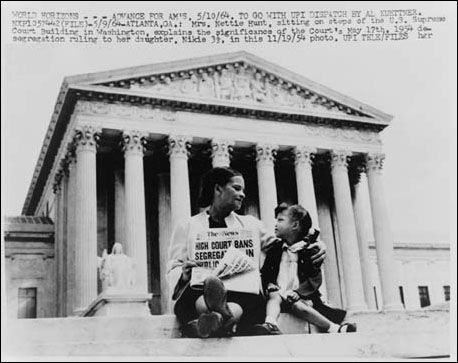
Sixty years ago this Saturday, the Supreme Court, by unanimous vote, ruled in Brown v. Board of Ed that separate schools for black and white Americans were not equal. The decision reversed the 1896 ruling in Plessy v. Ferguson, which had said that "separate but equal" was OK—and was, to say the least, a major setback for civil rights in the United States. While Newsweek reflected in 1954 that Brown v. Board of Ed would "ultimately…mean the end of segregation in all public places, everywhere in the United States," it would take another decade for the federal government, with the Civil Rights Act of 1964, to make segregation in places like restaurants illegal.
Here, in a series of excerpts, is how Newsweek responded in an unbylined article in the May 24, 1954, issue of the magazine. The writing style clearly reflects the attitudes and norms of the times; the use of the term Negro, for example, feels jarring and insensitive today.

Its initial reaction to the verdict:
It was the most momentous court decision in the whole history of the Negro's struggle to achieve equal rights in the United States, and the result will be nothing short of social upheaval.
The challenges ahead:
Personal prejudice against the Negro will, of course, linger on, for, although a court decision can restrain the actions of man, it cannot change overnight the way he thinks. Prejudice, however, no longer will become institutionalized; 'Jim Crow' will become an outlaw.
The reaction in the South:
The court's decision was greeted calmly by some Southerners, and with dismay by others. At least three Southern states—Georgia, Mississippi, and South Carolina—had been talking of circumventing a ban on segregation by eliminating public schools altogether.
Then there's the fact that the South is a diverse place:
For there is not one South, but many. [Georgia, Mississippi, and South Carolina] represent the plantation South, where, in some places, Negroes outnumber whites by 10 to 1. In such places, the mold of segregation will prove almost unbreakable.

How the verdict will go down in the "mountain South":
The court's decision isn't expected to cause a ripple in the mountain South. The mountain South has never gotten worked up about the issue of segregation because there are so few Negroes there.
After discussing "the Piedmont South," which is industrial and not as pro-segregation as "the plantation South," Newsweek focused on a more rural part of the South:
Sentiment for segregation is strong in the piney-woods country, too. The piney-woods country is naval-stores country, sawmill country; it's as rough as a cob. Economic factors have kept segregation strong in the piney woods, but, again, not strong enough to presage violence.
Newsweek notes that in practical terms, not much might change in some places after the verdict, since blacks and whites live in different parts of town anyway. But then there's the symbolism of the court's decision, both domestically and internationally:
However, the psychological effect will be tremendous. For, over the years, segregation in the public schools has become a symbol of inequality, not only to Negroes in the United States but to colored peoples elsewhere in the world. It has also been a weapon of world Communism. Now that symbol lies shattered.
Uncommon Knowledge
Newsweek is committed to challenging conventional wisdom and finding connections in the search for common ground.
Newsweek is committed to challenging conventional wisdom and finding connections in the search for common ground.
About the writer
Rob Verger is liaison to Newsweek’s foreign editions and also reports, writes, and edits. In addition to Newsweek and its ... Read more
To read how Newsweek uses AI as a newsroom tool, Click here.





